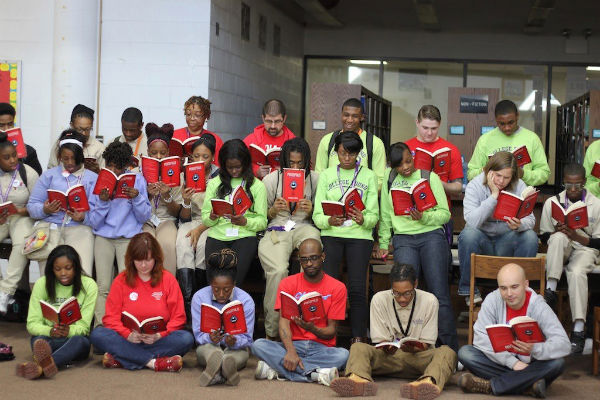
As we are all aware now last week at Lane Tech, Persepolis was removed from classrooms as demanded by a CPS mandate. The removal of books and the banning of Persepolis immediately prompted students and teachers to protest this decision. Later that same day, Barbara Byrd-Bennett said the banning of Persepolis is only for grades seven and under. She went on to say that the book will be reviewed to determine if it is appropriate for grades eight through 10.
Currently, only 11th and 12th graders are allowed to read the book per the new CPS ruling.
The book is a historical and autobiographical account of the author as a young girl growing up under dictatorial rule in Iran and the revolutions led by the people in an attempt to bring in Democracy.
As a history teacher I decided to let my students review the book and decide if the banning of Persepolis by CPS and Barbara Byrd-Bennett was justified.
Out of the 71 students who took part in the lesson, discussions, and read through Persepolis, 53 students did not agree with the ban imposed by CPS and Barbara Byrd-Bennett. Many of the other 18 students thought that the teacher should decide if the book is appropriate for their students -- not CPS.
The following are direct quotes from my junior and senior high school students in Englewood.

Renika: "Persepolis is not inappropriate, it may have violence, but violence is in the everyday life of a seventh grader."
Ty'Neequa: "This is something that actually happened, just like people were tortured and killed in the Holocaust. CPS shouldn't be able to keep information like this from students. We need to learn about revolutions in other countries. The banning of Persepolis would be like CPS trying to prevent teachers from teaching slavery."
Jaydeisha: "Teachers know what their students are capable of handling, so if they feel their students couldn't take the book -- they wouldn't let them read it."
Malik: "Children deserve to know the truth."
Toriana: "There are things in this book that we need to know. Young students in CPS learn about slavery, and just like slavery bad things happen to different races too. I think students need to know every piece of information that we can. "
Latoria: "The truth of the book is not much different than what kids see in their neighborhoods every day."
Amanda: "There isn't a problem when teachers teach about the tragedies around Native Americans, African slaves, Mexicans or any other culture that has experienced tragedies and racism -- so what is the difference with this?"
Tomas: "Teachers should be able to decide if they want to teach the book or not to their students."
Ray: "This book tells us what actually happened during the Iranian Revolution."
Alexis: "This book shows a lot of emotions such as love, hate and struggle. It is important to know the true events surrounding the life of this girl."
Tyranesha: "Teachers should be able to decide at what age to teach this book, because teachers know if their students are mature enough for the book. Students shouldn't be disrupted of their education because CPS thinks they are not mature enough. The teachers know what the kids can and cannot handle."
As teachers, we are the experts in curriculum and instruction. If teachers felt like students would not be mature enough or able to understand the content, then teachers would not use a book such as this.
Chicago Public Schools under the "guidance" of Barbara Byrd-Bennett is taking the ability of planning and making appropriate instructional practices away from the experts (we teachers).
Until last week, Persepolis was only banned in Iran, but now Chicago and Iran have much more in common.
"I feel badly for the children, because it sends a message to them that there is something wrong with reading -- that we don't want them to read this book because there's something in it that we don't want them to know." -- Judy Blume
The quote from acclaimed children's book author Judy Blume in response to censorship unfortunately sums up the repressive state that Chicago Public Schools is sadly becoming by banning books and closing schools.
